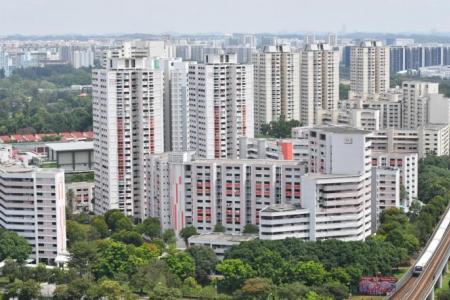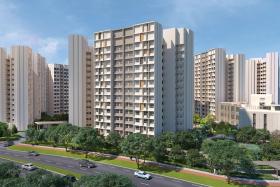Over 80 existing HDB blocks in Jurong, Yishun to have rainwater harvesting systems from 2027
From 2027, more than 80 Housing Board blocks in Jurong and Yishun will be able to conserve more water with rainwater harvesting systems installed at those estates.
This is the first time existing housing estates will have rainwater harvesting facilities, under the Housing and Development Board's (HDB) UrbanWater Harvesting System initiative, which has been installed in new Build-to-Order (BTO) housing estates since 2018.
HDB estimates that about 15 UrbanWater Harvesting Systems will be installed across 89 blocks in the two towns, and the rainwater collected can be used to wash common areas and water plants in the estates, among other non-potable uses.
The 15 systems can potentially save about 17,500 cubic metres of water per year, which is equivalent to the average amount of potable water used in more than 85 four-room HDB flats in a year.
Beyond conserving water, rainwater collected by the system can mitigate flash floods at neighbourhoods and estates during a deluge, as it slows down the rate of storm water discharge into the drainage system.
HDB called a tender on Monday (March 28), for the installation of the system at the two towns.
The tender will close on May 20, and construction of the system is expected to start next year and finish in 2027.
Within each harvesting facility, rainwater runoff around multiple residential blocks will be discharged into the estate's surrounding drainage system, and then channelled into the facility's harvesting and detention tank.
The water collected from one system can serve the non-potable water needs of 12 residential blocks and the reused water can save up to 50 per cent of water at those blocks.
The system has been incorporated in new BTO projects such as Punggol Northshore Residences and Tengah town.
The projects at Jurong and Yishun will be considered a pilot since retrofitting the system within existing estates is more challenging, said HDB in a statement.
This is because suitable locations for the system need to be identified, as there are other older and essential infrastructure that would already be in place underground. The flow of rainwater within the area will also need to be analysed.
It is easier to implement rainwater harvesting in new BTO projects because the system's infrastructure can be planned and designed upfront to ensure it is located where the most amount of rainwater can be collected, explained HDB.
The pilot in Yishun and Jurong will be used to assess how the system can be used in existing estates, and guide the extent of potential scale-ups in the future.
Blocks 201 to 216 at Yishun Avenue 2 and Blocks 329 to 341 at Jurong East Avenue 1 are some of the areas where the system will be introduced.
"HDB will study the cost-effectiveness of the system in reducing potable water consumption and mitigating flood risks in existing HDB estates, before deciding on the extent of future scale-up to other suitable estates," added the housing board.
HDB chief executive Tan Meng Dui said: "With the vast majority of our residents staying in existing estates, we have taken a further step to pilot the (UrbanWater Harvesting) System in existing HDB estates.
"While such brownfield developments will be more challenging to implement... the extension of the (system) to existing estates will help to level up the sustainability provisions of our existing estates, and bring the benefits of green and sustainable living to more residents and towns."
The system is a key tenet of the 10-year HDB Green Towns Programme, which aims to make existing towns more environmentally sustainable and liveable by cooling them, reducing energy consumption and recycling rainwater.
HDB announced on Monday that 1,198 more housing blocks and 57 government sites will have solar panels installed, under the sixth edition of the SolarNova scheme.
This upcoming edition will cover HDB blocks under Sembawang, Tampines, and Tanjong Pagar, including 40 schools and two fire stations.
To date, 2,700 HDB blocks have been installed with solar panels under the programme.
The sixth tender was jointly awarded to engineering contractor firm Digo Corporation and solar energy firm Terrenus Energy.
Installation of the solar panels and photovoltaic systems - with a total capacity of 70 megawatt-peak - is expected to begin in the third quarter of this year and finish by early 2025.
To date, HDB has called seven tenders under the SolarNova programme, with the last one called last month. The programme's target is to reach a solar capacity of 540 megawatt-peak by 2030.
The seven tenders have committed 380 megawatt-peak, equivalent to powering 95,000 four-room flats.
Upcoming initiatives under the HDB Green Towns Programme were unveiled during the Budget debate in Parliament earlier this month.
They include more e-waste recycling bins and electric vehicle charging points within HDB estates, and the use of light emitting surfaces for block signages.
Get The New Paper on your phone with the free TNP app. Download from the Apple App Store or Google Play Store now


